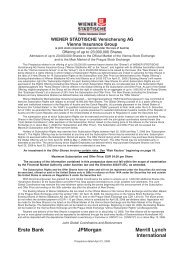contacts
contacts
contacts
You also want an ePaper? Increase the reach of your titles
YUMPU automatically turns print PDFs into web optimized ePapers that Google loves.
MACRO<br />
Martin Lobotka, mlobotka@csas.cz ; tel: 224 995 192<br />
Real economy is doing well; strong German economy is dragging along also the Czech Republic and other economies tightly linked to<br />
Germany - this is also visible from 3Q/10 GDP data (Czech economy grew by 1.1% q/q, Poland by 1.3% q/q). Also preliminary data<br />
for 4Q/10 does not point to any substantial slowdown – leading indicators remain high (PMI slightly higher in November - at 57.3,<br />
German IFO continues increasing) pointing to a continued recovery and what will likely be a two-digit growth of industry also in 4Q<br />
(and that despite a higher base from 2009). PMI also suggests further growth of employment which is highest since 4Q/07. That,<br />
together with weaker Euro (on continued debt worries) and falling unemployment in Germany, raises hopes that recovery will go on<br />
– in the near future the recovery will still be able to rely on strong German export; after this factor wears out (due to stronger Euro<br />
and weaker dynamics of China on the back of monetary tightening) there will already be revived consumer demand to (at least<br />
partially) step in. We thus expect no dramatic slowdown, not at all another wave of recession. The planned fiscal restriction should<br />
also by far avoid disrupting the ongoing recovery.<br />
Czech National Bank published its new inflation projection and it is almost as pessimistic as that of labor union CMKOS. CNB expects<br />
the economy to grow by 1.2% which is some 0.8pp below the consensus as well as our forecast or that of the MinFin. We find CNB<br />
overly pessimistic (similarly as it was in 2009, when it expected the economy to grow by 1.4% in 2010 vs. our forecast of 2.0%<br />
which will likely undershoot the actual figure by some 0.2-0.3pp). What are the implications for rates? For the central bank,<br />
everything is crystal clear – the economy will grow around 1% y/y, there will be no inflation whatsoever, and thus rates can remain<br />
low for quite some time. We are more concerned – yes, we are more bullish on the real economy but having seen what was going<br />
on last year (economy growing on average by 0.7pp q/q since summer 2009 and koruna giving no reasons to worry and rates still<br />
went down by 50bp), we are more careful. Yes, we think that rates should be some 25-50bp higher than they are at this point, but<br />
the cautiousness on the side of CNB, still not-so-good labor market, and low current inflation will likely keep the central bank from<br />
hiking at least for one quarter’s time. February is probably the earliest possible candidate for a rate hike, as at that point new<br />
inflation prognosis will be ready and CNB will see a confirmation of solid growth in the real data by then. The risks of further delays<br />
because of this cautiousness on the side of CNB are still present, though.<br />
EURCZK is momentarily weaker but that will not be a factor in rate-setting decision. We think that values around 25 are fundamentally<br />
justifiable and therefore neutral for monetary policy. Within the next couple of weeks we expect it to strengthen mildly or, better said,<br />
to oscillate within the region of 24.5-25.0. Levels below 24.5, close to 24, would make sense in the second half of the year. Risks of<br />
further weakening are relatively small – it would require a serious trouble in EMU for koruna to rally above 25.5. Given that Polish<br />
zloty and Hungarian forint have already went through certain correction after the recent sell-off (driven to 4.10 and 285, respectively)<br />
– it is just koruna that remains around its lows – we think that some strengthening (to below 24.70) can be expected.<br />
Long-end swap and bond yields grew last month (by 40 and 25bp, respectively) which was in line with our prognosis (we’ve been<br />
expecting higher yields for quite some time). The main reason was debt crisis and correction from levels that corresponded to<br />
recession expectations. The same factors are affecting other sovereign yields; naturally, yields of structurally unbalanced south<br />
(+Ireland) are some 200bp (and more) above German yields and we also see an upside pressure for the strong core of EMU<br />
(Germany and France). In the coming months we expect slightly higher yields in Germany as well as in CR, but the spread between<br />
the two should contract mildly; from about 100bp to some 75-80bp. If it is debt worries and expected cost to western economies of<br />
rescue package for south that is driving yields up, then the Czech Republic should not be affected that much<br />
- 2 - 7.12.2010



